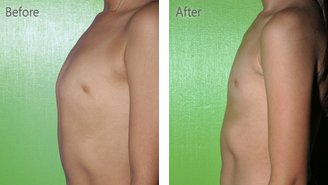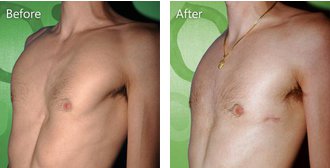The Chest Wall Deformity Center of Excellence at Nicklaus Children's Hospital is Florida’s leader in the assessment and treatment of chest wall deformities, and is the only center in the state offering comprehensive treatment for the more rare pectus carinatum.
The Center offers both traditional surgeries as well as minimally-invasive operations for chest wall deformities. Treatment options are reviewed and a course of treatment is selected with input from the family, based on the severity and asymmetry of the defect. Operative repairs are customized to best correct the specific condition noted in each patient.
Our Center's Commitment
The team at Nicklaus Children's Hospital strives to give each child or young adult with a chest wall abnormality the best treatment possible, using all the newest technology.
We commit to customizing a path to normalizing the chest contour as quickly and as efficiently regardless of the specific anomaly. For operative repair, the pediatric surgeons work with the physical therapists, nurses and other physicians, including anesthesiologists and other pain team members, radiologists, geneticists and orthopedic surgeons, to make recovery as painless and efficient as possible. For non-operative treatments, our therapists and orthotist work with the surgeon for expeditious correction without the risks and discomfort of surgery. We recognize the trust you put in us as we care for your children.
Nonsurgical treatment for children with protruding chest
The Chest Wall Deformity Center of Excellence at Nicklaus Children's Hospital is the only facility in Florida to offer an FDA-approved bracing treatment for pectus carinatum in addition to comprehensive surgical options for children and teens.
Chest bracing therapy is a nonsurgical method to treat pectus carinatum that utilizes a customized chest-wall brace, custom built for the specifics of each patient, to reduce the chest protrusion over time. The brace is worn under clothing and, in combination with an exercise program, may completely correct the problem. The duration of bracing depends on the type and severity of the protrusion, but most defects typically respond well with six to eight months of treatment.

Innovative surgery for patients with sunken chest
Approximately one in 1,000 children suffers from pectus excavatum, a congenital deformity of the chest in which the sternum or breastbone faces inward, applying pressure to the heart and lungs. This disorder can restrict the growth of the vital chest organs, becoming more serious as a child grows up. Symptoms of this disorder may include chest pain, mitral valve prolapse, heart palpitations, respiratory disease and exercise intolerance.
Our pediatric surgical team has applied an innovative surgical treatment to correct this condition, with numerous benefits to young patients. Using minimally invasive surgical procedures, a stainless steel bar is implanted to reshape the patient's sunken chest. This bar supports the chest until the child's body has molded to a more normal position, a process that takes approximately two years in most cases.
Pectus excavatum surgery requires only a few incisions, reducing scarring, and requires approximately 40 minutes, compared to the four to six hours required for chest reconstruction. Blood loss is also minimal compared with other procedures. Children usually can return to their normal activities in about a month.
Pectus excavatum surgery provides excellent long-term functional and cosmetic results, making it easier for the child to breathe, while restoring normal chest expansion and proper lung and heart growth.
